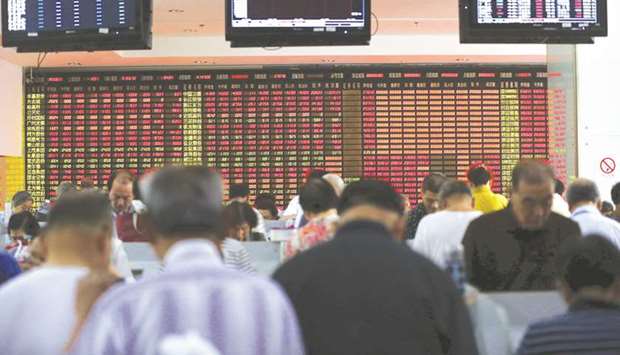Asian markets rallied yesterday with Shanghai bouncing back as bargain-buyers stepped in after the previous day’s rout, but trading floors remained anxious as China’s deadly virus claimed more lives.
Investors tracked gains on Wall Street and in Europe following last week’s rout, though focus remains on authorities’ efforts to contain an outbreak that has now infected 20,400 and killed more in mainland China than the Sars epidemic which hammered Asian economies in 2003.
The virus has now spread to more than 20 countries.
Several have imposed tough travel rules including banning flights to and from China, while the World Health Organization has declared a global health emergency.
In a rare admission, Beijing admitted “shortcomings and difficulties” in its response to the crisis, which many fear could slash growth in the world’s number two economy and impact other countries that rely on its supply chains.
Observers said China’s leaders were considering lowering their GDP forecasts for this year owing to the epidemic.
“The coronavirus is currently inflicting a heavy blow to its economy, so it stands to reason that growth will be much weaker, even if there is ultimately a rebound of sorts next quarter on a quick passing of the viral epidemic,” said National Australia Bank’s David de Garis.
Having dived nearly 8% on Monday, Shanghai stocks rose 1.3% — boosted by a central bank injection of almost $60bn into the financial markets, which is on top of the $173bn pumped in on Monday.
Hong Kong climbed more than 1% a day after data showed the city’s economy contracted last year for the first time since 2009, but at a slightly slower rate than feared.
The gains were despite news that the city had seen the first death of a patient who had contracted the coronavirus.
Casinos, however, were deep in the red after Macau said it would close all gaming houses in the gambling hub for two weeks because of the outbreak.
Wynn Macau, Galaxy Entertainment and Sands China were all sharply down.
Singapore, Seoul, Mumbai, Manila and Taipei all surged between 1.3% and 2%, while Sydney put on 0.4%, and Jakarta added 0.7%. Tokyo finished 0.5% higher.
“We are entering a key phase of the outbreak now in terms of how we measure the economic damage and whether it produces a material reduction in equity valuations,” said Neil Wilson at Markets.com.
The buying sentiment extended to the oil markets, where both main contracts rose after plunging Monday on worries about the effect on demand for the commodity in the world’s biggest consumer.
Opec and other major producers will gather this week to analyse the price drops, a source close to the cartel said at the weekend.
On currency markets, the pound dropped again after taking a hit Monday against the dollar and euro following Britain and the European Union offering very different ideas for their future relationship that fanned concerns about this year’s trade talks.
The conflicting visions raised the possibility of tariffs and increased barriers being thrown up that could cripple supply chains.
“The tough talk from both sides has thrown quite a bit of cold water onto the post-election Boris bounce,” Ned Rumpeltin, at Toronto-Dominion Bank in London, said.
In early European trade, London jumped more than 1%, while Paris added 0.6% and Frankfurt gained 0.7%.
In Shanghai, the Composite closed up 1.3% to 2,783.29 points; Hong Kong — Hang Seng ended up 1.2% to 26,675.98 points and Tokyo — Nikkei 225 closed up 0.5% to 23,084.59 points yesterday.

Investors look at computer screens in front of an electronic board showing stock information at a brokerage house in Shanghai. The Composite index closed up 1.3% to 2,783.29 points yesterday.
